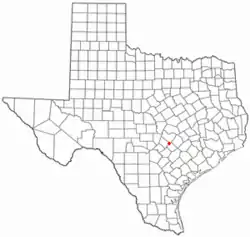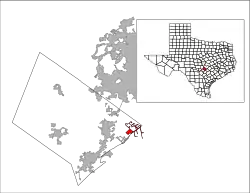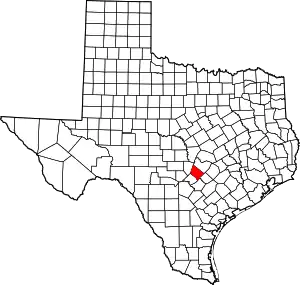Niederwald, Texas | |
|---|---|
 Location of Niederwald, Texas | |
 | |
| Coordinates: 30°0′23″N 97°45′0″W / 30.00639°N 97.75000°W | |
| Country | United States |
| State | Texas |
| Counties | Hays, Caldwell |
| Area | |
| • Total | 3.67 sq mi (9.50 km2) |
| • Land | 3.67 sq mi (9.50 km2) |
| • Water | 0.00 sq mi (0.00 km2) |
| Elevation | 561 ft (171 m) |
| Population (2010) | |
| • Total | 565 |
| • Estimate (2019)[2] | 599 |
| • Density | 163.35/sq mi (63.07/km2) |
| Time zone | UTC-6 (Central (CST)) |
| • Summer (DST) | UTC-5 (CDT) |
| ZIP code | 78640 |
| Area code | 512 |
| FIPS code | 48-51492[3] |
| GNIS feature ID | 1342596[4] |
| Website | www |
Niederwald is a city[5] in Caldwell and Hays counties in the U.S. state of Texas. The population was 565 at the 2010 census.[6] Niederwald means "low forest", or "low wood", in German. It was named Niederwald by the German founders of the town. This region of Central Texas was settled in the 1800s primarily by Germans and European emigrants and is referred to as the Texas-German belt by locals.[7]
Geography
Niederwald is located in eastern Hays County and northern Caldwell County at 30°0′23″N 97°45′0″W / 30.00639°N 97.75000°W (30.006397, –97.750056).[8] Texas State Highway 21 is the main road, leading southwest 15 miles (24 km) to San Marcos and east 26 miles (42 km) to Bastrop. Austin is 24 miles (39 km) to the north.
According to the United States Census Bureau, the town has a total area of 3.7 square miles (9.5 km2). None of the area is covered with water.[6]
Demographics
| Census | Pop. | Note | %± |
|---|---|---|---|
| 1990 | 233 | — | |
| 2000 | 584 | 150.6% | |
| 2010 | 565 | −3.3% | |
| 2020 | 668 | 18.2% | |
| U.S. Decennial Census[9] | |||
| Race | Number | Percentage |
|---|---|---|
| Hispanic or Latino | 378 | 56.59% |
| White (NH) | 261 | 39.07% |
| Black or African American (NH) | 17 | 2.54% |
| Asian (NH) | 4 | 0.60% |
| Some Other Race (NH) | 1 | 0.15% |
| Mixed/Multi-Racial (NH) | 7 | 1.05% |
| Total | 668 |
At the 2000 census there were 584 people.192 households, and 158 families in the city. The population density was 196.8 inhabitants per square mile (76.0/km2). There were 199 housing units at an average density of 67.1 per square mile (25.9/km2). The racial makeup of the town was 75.17% White, 3.94% African American, 1.54% Native American, 1.37% Asian, 16.44% from other races, and 1.54% from two or more races. Hispanic or Latino of any race were 32.19%.[3]
Of the 192 households 44.3% had children under the age of 18 living with them, 67.7% were married couples living together, 8.3% had a female householder with no husband present, and 17.7% were non-families. 10.4% of households were one person and 2.6% were one person aged 65 or older. The average household size was 3.04 and the average family size was 3.27.
The age distribution was 28.8% under the age of 18, 8.6% from 18 to 24, 35.3% from 25 to 44, 21.6% from 45 to 64, and 5.8% 65 or older. The median age was 34 years. For every 100 females, there were 104.2 males. For every 100 females age 18 and over, there were 101.9 males.
The median household income was $54,375 and the median family income was $61,750. Males had a median income of $28,750 versus $26,932 for females. The per capita income for the town was $21,236. None of the families and 1.8% of the population were living below the poverty line, including no under eighteens and 2.5% of those over 64.
References
- ↑ "2019 U.S. Gazetteer Files". United States Census Bureau. Retrieved August 7, 2020.
- ↑
- 1 2 "U.S. Census website". United States Census Bureau. Retrieved January 31, 2008.
- ↑ "US Board on Geographic Names". United States Geological Survey. October 25, 2007. Retrieved January 31, 2008.
- ↑ US Census change list Archived 2006-02-06 at the Wayback Machine
- 1 2 "Geographic Identifiers: 2010 Census Summary File 1 (G001): Niederwald city, Texas". U.S. Census Bureau, American Factfinder. Archived from the original on February 13, 2020. Retrieved July 7, 2015.
- ↑ https://cityofniederwald.org/#:~:text=Built%20along%20the%20old%20Austin,as%20a%20city%20in%201987.
- ↑ "US Gazetteer files: 2010, 2000, and 1990". United States Census Bureau. February 12, 2011. Retrieved April 23, 2011.
- ↑ "Census of Population and Housing". Census.gov. Retrieved June 4, 2015.
- ↑ "Explore Census Data". data.census.gov. Retrieved May 24, 2022.
- ↑ "About the Hispanic Population and its Origin". www.census.gov. Retrieved May 18, 2022.

